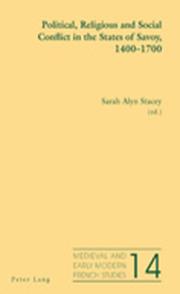Summary Report of The Centre for Medieval and Renaissance Studies, Trinity College Dublin, 2013-2014
The Centre for Medieval and Renaissance Studies had a very productive year in terms of research output (conferences, seminars, publications), promotion of the early period through its various activities (public lectures, conferences, seminars) and engagement with the public. In these various ways it has enhanced the research profile of its host unit and of the College. Highlights of the year include the following events:
- Support for the Postgraduate Conference ‘Jerusalem as Construct in Tradition and History’, held 2-3 September 2013 in Trinity and organized by the Department of Near and Middle Eastern Studies and the Herzog Centre.
- ‘The Irishness of the Hon. Arthur Wesley, Ist Duke of Wellington’, 4-5 October 2013, a conference taking as its starting point the medieval ancestry of the Duke of Wellington. This conference brought together a range of eminent historians from Oxford, Cambridge, Liverpool and Trinity to discuss and highlight the problematics of writing history, the influence of popular misconception in constructing the past, and the constructs of national and European identity, so consolidating the Centre’s exploration of themes begun in the previous academic year. The conference
-permitted an opportunity for public engagement;
-consolidated collaborative links with Kells (particularly appropriate given the town’s rich medieval heritage);
-secured most generous sponsorship from Kells Tourism Forum, various local businesses and the Town Council as well as sponsorship from The Irish Times;
-gave significant publicity to the Centre/College in light of the extensive coverage it received in the local and national press (notably The Irish Times), on Twitter, and from such societies as The Napoleon Society of Ireland;
-has promoted in very concrete ways avenues for future research collaboration between the various speakers who participated (Appendix 1).
- Dual Launch of Michael Broers’ book, Napoloeon: Soldier of Destiny and the research theme, ‘France and the Construction of Europe 1400-1800’ (financed in part by the French Embassy) on 1 May 2014 (Appendix 2).
- Relaunch of the Centre’s refereed book series which moved from Brepols to Peter Lang. Entitled ‘Court Cultures of the Middle Ages and Renaissance’, it already has several titles in preparation.
- Publication of ‘Truthe is the beste’: a Festschrift in Honour of A.V.C.Schmidt, ed. Nicolas Jacobs and Gerald Morgan in the Centre’s new series (Appendix 3).
- Successful sponsorship bid to the learned society Medium Aevum to procure funding towards the publication costs of the first book in the new series.
NB. It would be desirable for some monies to be made available by the College expressly to help cover the series’ publication costs, for example, E3, 000 per annum.
- Publication of Political, Religious and Social Conflict in the States of Savoy, 1400-1700, ed. Sarah Alyn Stacey(Oxford, Peter Lang, 2014), the refereed volume of essays arising from the Centre’s 2010 conference ‘Les Conflits en Savoie 1400-1800’ (Appendix 4).
- Publication of Negotiating Co-Existence: Communities, Cultures and Convivencia in Byzantine Society, ed. Barbara Crostini and B.C.Sergio (BAC, Bochumer altertumswissenschafliches Colloquium, Band 96, 2013). This refereed volume of articles arose from the Centre’s Research Network, ‘Byzantine Studies’, and is based on the international conference it organised 1-3 October 2010 with funding from the European Science Foundation (Appendix 5).
- Establishment of a new Research Network based around the Old Library’s Waldensian holdings and involving international specialists in the field.This project was proposed by the Centre for the research theme ‘Manuscript, Book and Print Cultures’ (Principal Investigator: Professor Anna Chahoud).
- Invitation to attend the Seanad for a debate about the 750th anniversary of the first Irish Parliament, the subject of considerable media coverage. Talk to follow 2014-2015 (Appendix 6)
- ‘The Chaucer Seminar’.
- Three talks in Kells by the Chaucer in Context Research Network in collaboration with the Chaucer Hub. This included an invitation to participate in the Hay Festival Kells (launched by the Provost in the Long Room on 18 June 2014) (Appendix 7).
- A historical film series offered by the Centre as part of its Outreach Programme (Appendix 8).
- Invitations to collaborate in the organization of a number of high-profile international academic conferences, notably ‘Fields of Conflict’ (2016) and the International Spenser Conference (2015).
- Renewal of two Visiting Research Fellowships (Dr Eavan O’Brien and Dr Gavin Hughes) with new appointments from a range of disciplines to follow.
- Publications of the Visiting Research Fellows and Directors of Research Networks continue to enhance the Centre’s research profile.
- The Centre’s MPhil in Medieval Language, Literature and Culture had a further successful year, showing its ability to attract students of a high calibre.
Dr Sarah Alyn Stacey, Senior Lecturer/Associate Professor, FTCD, Académie de Savoie,
Centre for Medieval and Renaissance Studies,
COLLEGE
19 August 2014
APPENDIX 1
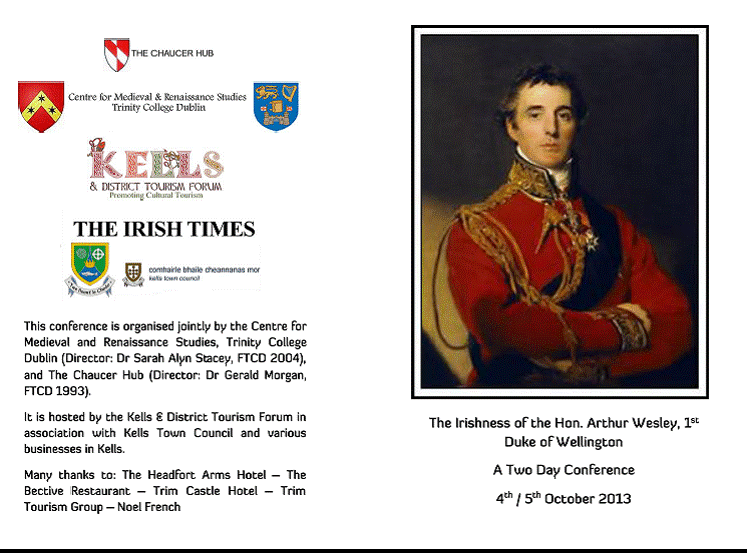
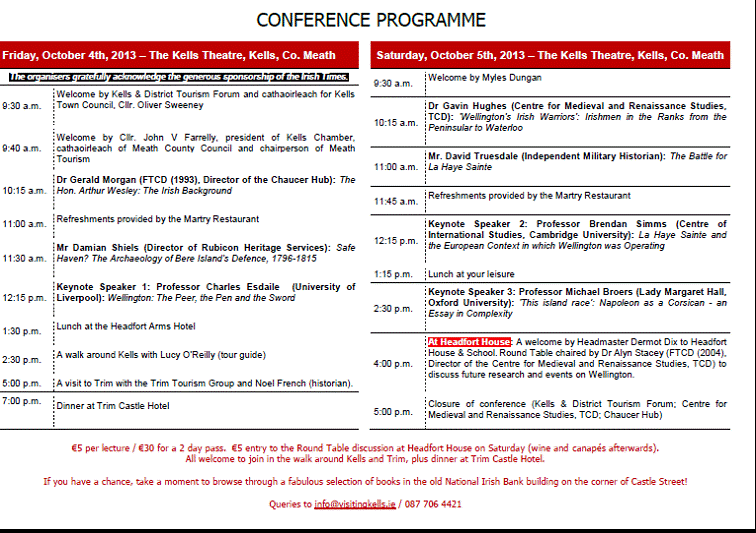
APPENDIX 2

THE CENTRE FOR MEDIEVAL AND RENAISSANCE STUDIES
TRINITY COLLEGE DUBLIN
INVITES YOU TO THE LAUNCH OF
NAPOLEON: SOLDIER OF DESTINY
BY MICHAEL BROERS (FABER AND FABER, 2014)
AND THE LAUNCH OF THE RESEARCH PROJECT
FRANCE AND THE CONSTRUCTION OF EUROPE, 1400-1918
AT NOON ON THURSDAY 1ST MAY 2014
IN THE NEILL/HOEY THEATRE, TRINITY LONG ROOM HUB ARTS & HUMANITIES RESEARCH INSTITUTE
RSVP TO DR SARAH ALYN STACEY BY MONDAY 28 APRIL 2014; email: salynsta@tcd.ie; tel. (00 353 1) 896 2686
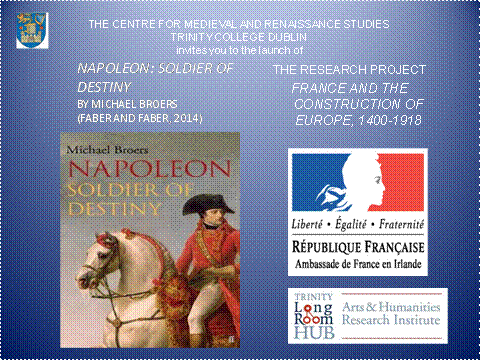
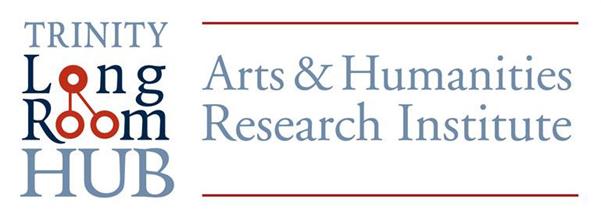
APPENDIX 3
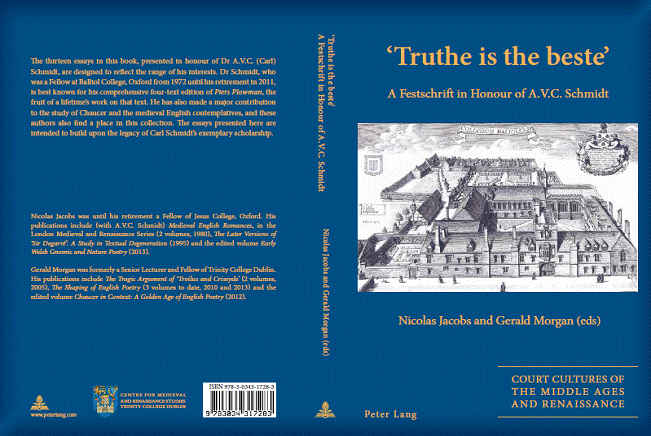
Alyn Stacey, Sarah (ed.)
Political, Religious and Social Conflict in the States of Savoy, 1400-1700
Oxford, Bern, Berlin, Bruxelles, Frankfurt am Main, New York, Wien, 2014. 317 pp.
Medieval and Early Modern French Studies. Vol. 14
Edited by Noël Peacock
Print: ISBN 978-3-0343-0831-1 pb. (Softcover)
SFR 68.00 / €* 59.90 / €** 61.60 / € 56.00 / £ 45.00 / US$ 72.95
eBook: ISBN 978-3-0353-0580-7
SFR 71.65 / €* 66.64 / €** 67.20 / € 56.00 / £ 45.00 / US$ 72.95
Taking conflict as its collective theme, this book brings together the work of early modern specialists to offer a range of insights into the political, social and religious climate in Savoy between 1400 and 1700. The contributors focus on the broader context of early modern European history, making clear the sometimes overlooked political and historical significance of Savoy. The volume explores the diverse mechanisms whereby political, social and religious conflicts were articulated with reference to a wide range of primary sources, many of which are unpublished. The chapters offer important perspectives on subjects such as: the diplomatic relations between the court of Savoy and certain foreign powers during a time of European unrest; the role of propaganda; the construction of national and religious identities; and persecution and resistance, notably in relation to the Reformation and the Waldensians. The conclusions that are established advance a better understanding of the history of Savoy and of the broader conflicts shaping Europe in the early modern period
APPENDIX 5
BAC 96 APPENDIX 6 |
[Taken from Trinity’s News and Events page]
Trinity Plays Key Role in Marking 750th Anniversary of First Recorded Parliament in IrelandSeanad debate held to mark the 750th anniversary of the first documented sitting of an administrative gathering to call itself a parliament in Ireland.
27 June 2014
Wednesday June 18, 2014 marked the 750th anniversary of the first documented sitting of an administrative gathering to call itself a parliament in Ireland of which an original contemporaneous manuscript record remains accessible. This gathering calling itself a parliament which is understood to have met in Castledermot in Kildare on 18 June, 1264 predates the English parliament which marks its 750th anniversary next year.
Recently the research of Assistant Professor Paul Horan of the School of Nursing and Midwifery, Trinity College Dublin brought this historic anniversary to public awareness in radio broadcasts, a publication in the May/June edition of History Ireland and a conference presentation at The History Ireland Festival 2014. Kildare County Council also held an out of chamber council meeting in March in Castledermot to mark the occassion.
Assistant Professor Horan was also instrumental in lobbying members of the Oireachtas to mark this historic juncture in Irish parliamentary democracy. Members of the Oireachtas marked the 750th anniversary of the "first recorded Irish parliament" with a debate in the Seanad on Wednesday June 18th, 2014. Labour Senator and Trinity Fellow Ivana Bacik proposed the debate which was addressed by the Minister of Arts and Heritage Jimmy Deenihan, T.D. Senator Bacik paid “tribute to members of the Castledermot Historical Society and Assistant Professor Horan from Trinity College who brought the historical date to her attention”.
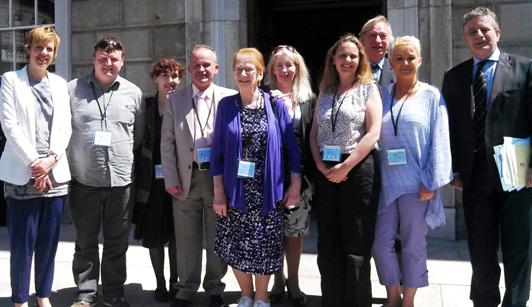
Senator Ivana Bacik; Joseph Kavanagh, YADA Ireland; Dr Sandrine Brisset, Assistant Professor Paul Horan, School of Nursing and Midwifery, Trinity; Maureen Kelly nee Horan; Professor Sarah Alyn Stacey, Director of the Centre for Medieval and Renaissance Studies, Trinity; Olivia English Kissane; Dr Sharon Greene (Castledermot Historical Society); Dr Gerald Morgan, The Chaucer Hub; Senator Sean Barrett.
The latin record of this earliest parliamentary sittings was first brought to Assistant Professor Horan’s attention by Dr Peter Crooks who curates Trinity College’s digital medieval manuscript resource which is available at chancery.tcd.ie. This wonderful resource contains many of the known Irish chancery rolls during the Middle Ages (1244–1509) drawing on sources in archival repositories in The Republic of Ireland, Northern Ireland, England and the USA. The site contains over 20,000 Irish records translated from Latin into English, together with an unparalleled collection of digital images of surviving medieval chancery letters and rare printed volumes.
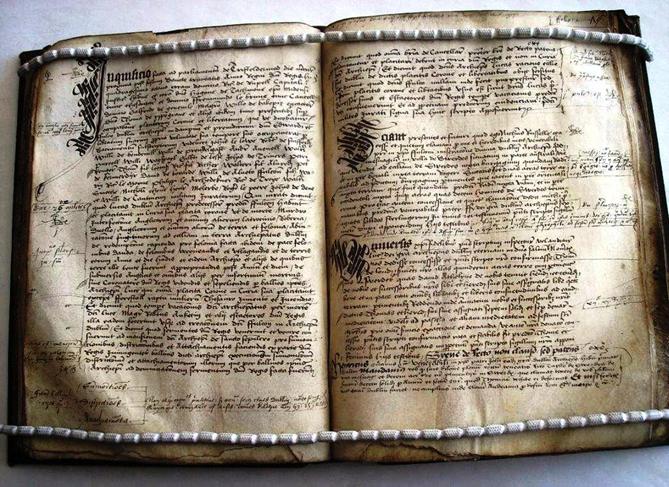
Folio 63 of Alani Registerum (Bishop Alen's Register), the transcribed record of the first recorded parliament in Ireland at Castledermot in 1264. (Reproduced with permission of Representative Church Body Library).
The actual original contemporaneous manuscript folio records of this earliest of recorded parliamentary sittings in Ireland unearthed by Assistant Prof Horan are contained in the Liber Niger and in its Tudor version the Aleni Registerum and are both contained in The Representative Church Body Library in Dublin. The original manuscript of the record of this historic parliamentary gathering is contained in the Liber Niger - The Black Book of Christchurch which is often on display in the Treasury in the Crypt of Christchurch Cathedral.
Media Coverage:
-
APPENDIX 7


The
Centre for Medieval &Renaissance Studies
Trinity College Dublin
in conjunction with The Chaucer Hub,
Hay Festival Kells, Kells Art Club and Kells and District Tourism
invites you to
a talk by
Dr Gerald Morgan, FTCD (1993)
‘Chaucer’s Miller’
followed by a screening of
The Miller’s Tale
(dir. John McKay, 2003)
Friday 4 July 2014 at 8.30 p.m.
in Martry Mill,
Kells, Co. Meath
With special thanks to James Tallon, owner of Martry Mill.
NB. There will be a shuttlebus from the Headfort Arms to Martry Mill
Enquiries: Dr Sarah Alyn Stacey, salynsta@tcd.ie; Ms Eileen Morgan Browne, eileenmorganbrowne@gmail.com
APPENDIX 8
TRINITY COLLEGE DUBLIN


CENTRE FOR MEDIEVAL AND RENAISSANCE STUDIES
OUTREACH PROGRAMME 2013-2014
Trinity’s Centre for Medieval and Renaissance Studies is delighted to launch a historical film series. Each screening will be preceded by a short lecture. All films have English subtitles.
Location: The Swift Theatre (Arts Building)
Time: 7.30 p.m.
28 November 2013 Lancelot du Lac (Robert Bresson, 1974), introduced by Dr Sarah Alyn Stacey
6 February 2014 Tous les matins du monde (Alain Corneau, 1991), introduced by Dr Sarah Alyn Stacey
13 February 2014 La conjura de El Escorial (Antonio del Real, 2008), introduced by Dr Eavan O’Brien
27 March 2014 Alexander Nevsky (Sergei Eisenstein, 1938), introduced by Dr Justin Doherty
ALL WELCOME
NB. There is no charge for this course. For further details, please contact Dr Sarah Alyn Stacey, Senior Lecturer/Associate Professor, FTCD, Centre for Medieval and Renaissance Studies/French Department, TCD; salynsta@tcd.ie; tel. 896 2686
CENTRE EVENTS
FORTHCOMING IN THE ACADEMIC YEAR
2013-2014
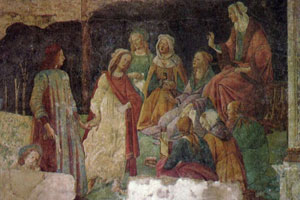
MICHAELMAS TERM 2013
1. THE IRISHNESS OF THE HON. ARTHUR WESLEY, 1ST DUKE OF WELLINGTON
A TWO-DAY CONFERENCE
Venue: The St Vincent de Paul Theatre, Kells, Co. Meath
Date: Friday 4 October-Saturday 5 October 2013

This conference is organized jointly by the Centre for Medieval and Renaissance Studies, Trinity College Dublin (Director: Dr Sarah Alyn Stacey, FTCD 2004), and The Chaucer Hub (Director: Dr Gerald Morgan, FTCD 1993). It is generously hosted by the Kells & District Tourism Forum in association with Kells Town Council and various businesses in the town of Kells. The Irish Times has generously sponsored the event.
 The Chaucer Hub
The Chaucer Hub
 Centre for Medieval & Renaissance Studies
Centre for Medieval & Renaissance Studies
Trinity College Dublin


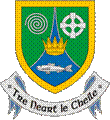
![]()
For further information on booking, accommodation and travel, please email info@visitingkells.ie or telephone 087 706 4421.
PROGRAMME
Friday October 4th 2013, The St Vincent de Paul Theatre, Kells, Co. Meath |
|
9:30 a.m. |
Welcome by Kells & District Tourism Forum and cathaoirleach for Kells Town Council, Cllr. Oliver Sweeney |
9:40 a.m. |
Welcome by Cllr. John V Farrelly, President of Kells Chamber, cathaoirleach of Meath County Council and Chairperson of Meath Tourism |
10:15 a.m. |
Dr Gerald Morgan (FTCD (1993), Director of the Chaucer Hub): The Hon. Arthur Wesley: The Irish Background |
11:00 a.m. |
Refreshments provided by the Martry Restaurant |
11:30 a.m. |
Mr Damian Shiels (Director of Rubicon Heritage Services): Safe Haven? The Archaeology of Bere Island's Defence, 1796-1815 |
12:15 p.m. |
Keynote Speaker 1: Professor Charles Esdaile (University of Liverpool): Wellington: The Peer, the Pen and the Sword |
1:30 p.m. |
Lunch at the Headfort Arms Hotel |
2:30 p.m. |
A walk around Kells with Lucy O’Reilly |
5:00 p.m. |
A visit to Trim with the Trim Tourism Group and Noel French (historian). |
7:00 p.m. |
Dinner at Trim Castle Hotel |
Saturday October 5th 2013, The St Vincent de Paul Theatre, Kells, Co. Meath |
|
9:30 a.m. |
Welcome (Kells & District Tourism Forum and Friends) |
10:15 a.m. |
Dr Gavin Hughes (Centre for Medieval and Renaissance Studies, TCD): 'Wellington's Irish Warriors': Irishmen in the Ranks from the Peninsular to Waterloo |
11:00 a.m. |
Mr. David Truesdale (Independent Military Historian): The Battle for La Haye Sainte |
11:45 a.m. |
Refreshments provided by the Martry Restaurant |
12:15 p.m. |
Keynote Speaker 2: Professor Brendan Simms (Centre of International Studies, Cambridge University): La Haye Sainte and the European Context in which Wellington was Operating |
1:15 p.m. |
Lunch at your leisure |
2:30 p.m. |
Keynote Speaker 3: Professor Michael Broers (Lady Margaret Hall, Oxford University): 'This island race’:Napoleon as a Corsican–an Essay in Complexity. |
4:00 p.m. |
At Headfort House: Round Table chaired by Dr Alyn Stacey (FTCD (2004), Director of the Centre for Medieval and Renaissance Studies, TCD) to discuss future research and events on Wellington. |
5:00 p.m. |
Closure of conference (Kells & District Tourism Forum; Centre for Medieval and Renaissance Studies, TCD; Chaucer Hub) |
2. THE CHAUCER SEMINAR
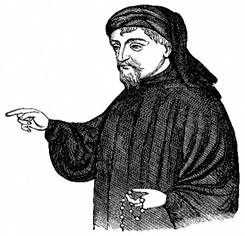
The Centre for Medieval and Renaissance Studies, in conjunction with The Chaucer Hub, is delighted to announce its third series of The Chaucer Seminar. This Seminar will be led, as previously, by Dr Gerald Morgan, Director of the Centre's Research Network Chaucer in Context and Director of the Chaucer Hub. Although it is aimed primarily at post-graduates, undergraduates* and members of the public with a good knowledge of Chaucer are most welcome to attend. The Seminar will focus on close textual analysis, sources and recent criticism. The Seminar will run on a weekly basis in Michaelmas Term and Hilary Term.
NB*Trinity undergraduates should note that this programme is not a substitute for courses run by the School of English.
To attend, please contact Dr Sarah Alyn Stacey, French Department/Centre for Medieval and Renaissance Studies; salynsta@tcd.ie; tel. 896 2686
3. FILMING THE EARLY MODERN PERIOD
Trinity’s Centre for Medieval and Renaissance Studies is delighted to launch a historical film series. Each screening will be preceded by a short lecture. All films have English subtitles.
Location: The Swift Theatre (Arts Building)
Time: 7.30 p.m.
28 November 2013 Lancelot du Lac (Robert Bresson, 1974), introduced by Dr Sarah Alyn Stacey
ALL WELCOME
NB. There is no charge for this course. For further details, please contact Dr Sarah Alyn Stacey, Senior Lecturer/Associate Professor, FTCD, Centre for Medieval and Renaissance Studies/French Department, TCD; salynsta@tcd.ie; tel. 896 2686
HILARY TERM 2014
1. FILMING THE EARLY MODERN PERIOD
Trinity’s Centre for Medieval and Renaissance Studies is delighted to launch a historical film series. Each screening will be preceded by a short lecture. All films have English subtitles.
Location:The Swift Theatre (Arts Building)
Time:7.30 p.m.
6 February 2014 Tous les matins du monde (Alain Corneau, 1991), introduced by Dr Sarah Alyn Stacey
13 February 2014 La conjura de El Escorial (Antonio del Real, 2008), introduced by Dr Eavan O’Brien
27 March 2014 Alexander Nevsky (Sergei Eisenstein, 1938), introduced by Dr Justin Doherty
ALL WELCOME
NB. There is no charge for this course. For further details, please contact Dr Sarah Alyn Stacey, Senior Lecturer/Associate Professor, FTCD, Centre for Medieval and Renaissance Studies/French Department, TCD; salynsta@tcd.ie; tel. 896 2686
TRINITY TERM 2014
1. Thursday 1 May
TRINITY COLLEGE DUBLIN
INVITES YOU TO THE LAUNCH OF
NAPOLEON SOLDIER OF DESTINY
BY MICHAEL BROERS (FABER AND FABER, 2014)
AND THE LAUNCH OF THE RESEARCH PROJECT
FRANCE AND THE CONSTRUCTION OF EUROPE, 1400-1918
AT NOON ON THURSDAY 1ST MAY 2014
IN THE NEILL/HOEY THEATRE, TRINITY LONG ROOM HUB ARTS & HUMANITIES RESEARCH INSTITUTE
RSVP TO DR SARAH ALYN STACEY BY WEDNESDAY 30 APRIL 2014; email: salynsta@tcd.ie; tel. (00 353 1) 896 2686
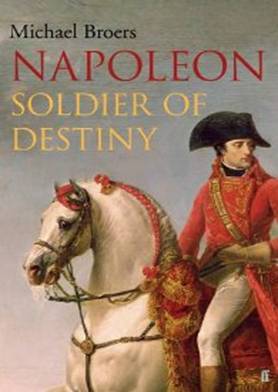

The first volume of a majestic new biography of the great ruler told with energy, style and brand new research.
This is the first life of Napoleon, in any language, that makes full use of the new version of his Correspondence compiled by the Fondation Napoléon in Paris to replace the sanitized compilation made under the Second French Empire as a propaganda exercise by his nephew, Napoleon III. All previous lives of Napoleon have relied more on the memoirs of others than on his own uncensored words.
Michael Broers' biography draws on the thoughts of Napoleon himself as his incomparable life unfolded. It reveals a man of intense emotion, but also of iron self-discipline; of acute intelligence and immeasurable energy. Tracing his life from its dangerous Corsican roots, through his rejection of his early identity, and the dangerous military encounters of his early career, it tells the story of the sheer determination, ruthlessness and careful calculation that won him the precarious mastery of Europe by 1807. After the epic battles of Austerlitz, Jena and Friedland, France was the dominant land power on the continent.
Here is the first life in which Napoleon speaks in his own voice, but not always as he wanted the world to hear him.
Michael Broers is Professor of Western European History at Oxford University. He is the author of, among other books about revolutionary and Napoleonic Europe, The Napoleonic Empire in Italy, 1796-1814, winner of the Grand Prix Napoléon Prize, 2006, and of Napoleon's Other War: Bandits, Rebels and their Pursuers in the Age of Revolutions.
2. Thursday 1 May: Launch of the Research Project France and the Construction of Europe, in the Neill/Hoey Theatre, Trinity Long Room Hub Arts & Humanities Research Institute
![]()
Centre for Medieval and Renaissance Studies,
Trinity College,
Dublin 2,
IRELAND
This inter-and pluri-disciplinary research project will consider the place of France in the construction of Europe from the early-modern period through to 1918 (chosen as it is a pivotal year for the shaping of France and Europe in the remainder of the twentieth century). The project, which involves colleagues from across the disciplines in Trinity and at other institutions (Oxford, Cambridge, Liverpool, Paris IV, amongst others), will be structured around the following questions and themes:
-what do we understand by the concept of Europe today?
-was there/is there a distinctly French concept of Europe that differs from that held by other nations?
-in what ways has a particular notion of Europe given rise to conflicts and negotiations of peace involving France since the early modern period?
-France and religious conflict;
-France and World War I;
-France and European diplomatic relations 1400-1918;
-European perceptions of the French Revolution;
-Napoleon and the construction of Europe;
-France and European trade;
-the place of women in France;
-the French contribution to European developments in the sciences, arts and humanities.
These questions will be approached in three stages:
- a series of seminars in the academic year 2014-15;
- a two-day international conference in September 2015 which will draw together and build upon the major strands of the seminar discussions/debates;
- a peer-reviewed volume of articles based on the seminars and conference.
Central to the project are a number of Trinity’s library holdings, for example, the Waldensian, Napoleonic, Fagel and Aspin holdings respectively. The questions the project will both attempt to raise and answer will have an essential relevance to the broader topical debates on national identity, notably European identity, and the relationship of the past to the present.
If you would like to participate in the project, please contact the Director of the Centre, Dr Sarah Alyn Stacey (salynsta@tcd.ie).
3. Monday 12 May 'Chaucer in the Modern World 1: The Wife of Bath', a lecture by Dr Gerald Morgan, The Chaucer Hub/Centre for Medieval and Renaissance Studies hosted by Kells Arts Club at the Headfort Arms Hotel. Organiser: Eileen Morgan Browne (eileenmorganbrown@gmail.com).
4. Monday 9 June 'Chaucer in the Modern World 2: The Knight's Tale', a lecture by Dr Gerald Morgan, The Chaucer Hub/Centre for Medieval and Renaissance Studies hosted by Kells Arts Club at the Headfort Arms Hotel. Organiser: Eileen Morgan Browne (eileenmorganbrown@gmail.com).
5. Friday 4 July 'Chaucer in the Modern World 3: The Miller's Tale', a lecture by Dr Gerald Morgan, The Chaucer Hub/Centre for Medieval and Renaissance Studies hosted by Kells Arts Club with the Hay festival in Martry Mill, Kells, courtesy of James Tallon. Organiser: Eileen Morgan Browne (eileenmorganbrown@gmail.com).


The
Centre for Medieval &Renaissance Studies
Trinity College Dublin
in conjunction with The Chaucer Hub,
Hay Festival Kells, Kells Art Club and Kells and District Tourism
invites you to
a talk by
Dr Gerald Morgan, FTCD
‘Chaucer's Miller’
followed by a screening of
The Miller’s Tale
(dir. John McKay, 2003)
Friday 4 July 2014 in Martry Mill,
Kells, Co. Meath
With special thanks to James Tallon, owner of Martry Mill.
NB. There will be a shuttlebus from the Headfort Arms to Martry Mill at 1.30 p.m.
Enquiries: Dr Sarah Alyn Stacey, salynsta@tcd.ie; Ms Eileen Morgan Browne, eileenmorganbrowne@gmail.com
